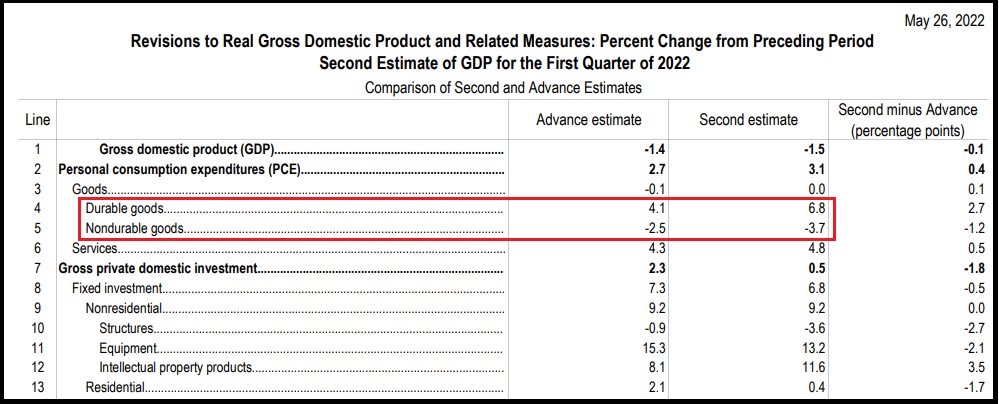
The Bureau of Economic Analysis (BEA) originally calculated the first quarter economy at a scale of -1.4% growth. The BEA revises that figure downward today with more data showing a contracted level of consumer spending [DATA HERE]. The economy contracted by -1.5% in the revised numbers.
Gross Domestic Product (GDP) is the dollar value of all goods and services produced in the economy, minus the dollar value of goods and services we import. The percentages discussed are percentages of change over time.

♦ What changed in this revision to make the economy worse?
(1) U.S. inflation was revised upward (prices increased); (2) the estimate of calculated inventories was lowered; (3) the estimate of consumer spending was raised (inflation issue); which leads to (4) a massive drop in the calculation of disposable incomes. [See the Change Table]
This table shows where the revisions are located:

Look at the revision to disposable incomes:

The Joe Biden’s economic policy is literally: (a) draining our savings and bank accounts, and (b) increasing our personal debt as we struggle to survive.
(Via MSM) – […] The U.S. economic contraction to start the year was worse than expected as weak business and private investment failed to offset strong consumer spending, the Commerce Department reported Thursday.
First-quarter gross domestic product declined at a 1.5% annual pace, according to the second estimate from the Bureau of Economic Analysis. That was worse than the 1.3% Dow Jones estimate and a write-down from the initially reported 1.4%.
Downward revisions for both private inventory and residential investment offset an upward change in consumer spending. A swelling trade deficit also subtracted from the GDP total.
The pullback in GDP represented the worst quarter since the pandemic-scarred Q2 of 2020 in which the U.S. fell into a recession spurred by a government-imposed economic shutdown to battle Covid-19. (read more)
These economic conditions are mostly driven by energy policy. U.S. energy policy underlines almost all economic activity and touches every facet of our lives as a consumer. You cannot change U.S. energy policy so drastically without changing every single economic aspect which is connected to energy policy.
What’s coming next? WATCH:
I concur with that prediction.
Prepare your affairs accordingly.

